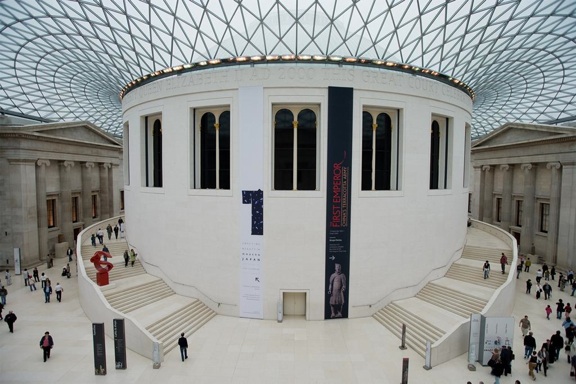Museums from the Outside In
| HOME | COURSE INFO | TRAVEL INFO | STUDENT WORK | RESOURCES |
COURSE INFORMATION

British Museum Great Court, 2000, Foster and Partners, Art on File
Course Schedules, Travel Information and Readings are available in the RESOURCES section of this site.
Please print these documents before we depart!
Course Overview
In this travel course, we will engage in a critical cultural study of museums in London and Paris. Using selected museums in each city, we will gain foundational knowledge of how to “read” museums as culturally constructed phenomena, and we will explore how particular forms of a museum’s construction and design both support and respond to national identity formations.
Our selection of museums will center on three central comparisons. We will compare the Louvre with The British Museum, both of which occupy the status of the first national public museum in their respective countries. Our second comparison will be between the Imperial War Museum in London and the Invalides and the MusŽe d’ArmŽe in Paris. And our third comparison will explore the The Museum of London and the MusŽe Carnavalet Đ Histoire de Paris, institutions which depict the histories of their respective countries through decidedly different artifact selection and exhibition strategies.
Course assignments will center on group presentations and creating a blog that responds to theoretical readings and structured on-site museum exercises.
Skidmore Orientation
Prior to our departure, we will hold two course sessions that will focus on preparing for the trip. In the first session, we will create groups and ask students to prepare profiles of the six museums we will study by investigating their web presence. These profiles will direct students to examine the central points of the museums’ mission statements and the various ways the museums present their histories, collections, and programming (including exhibitions). This assignment will take the form of the first blog entry the students will complete for the course. In connection with this assignment, we will introduce blogging and lead a practice session on using the technology.
In the second session, students will present their museum profiles in the context of a discussion that will lay the groundwork for our on-site study. In this session we will also go over course and travel logistics, including assigning a reading to be done before our arrival in London.
Pedagogical and Structural Rationale
The pedagogical rationale for this course is based on our experience that students need to be in the museum space to engage the issues actively. By beginning the course with a focus on learning how to “read” a museum and one of its primary exhibitions, we will set the groundwork for students to understand that the museums are the primary texts we will explore. Throughout the course as we apply critical readings to these primary texts and as we build points of comparison between museums, national identity issues will emerge in class discussions and on-site assignments.
Our structural rationale supports the pedagogical underpinnings of the course by allotting ten days in London and seven days in Paris. The extra time in London will be devoted to coursework that centers on foundational critical readings. This time will allow us to move more slowly initially, and access to classroom space in London will support our supplementary discussions outside of the museum. Professor Bender’s experience teaching “Reading British Identity in London’s Museums” has shown us that London’s museums are particularly accessible for the foundational coursework that will begin our study.
During our time in Paris, we will move more quickly through the museum spaces because students will have established foundational museum literacy skills. At this point in the seminar we will return to readings we have already considered to deepen our understanding of the complex ideas that they represent and to use them as lenses through which we can make productive comparisons between the museums in the two cities (and national cultures) that are at the center of our inquiry. In our final days in Paris, the structure of the course changes to give students the opportunity to explore the museums on their own in an effort to deepen a critical comparison between a London and a Paris museum and finalize their museum blogs.
Learning Goals
- Students will develop the intellectual and visual vocabulary to encounter museums critically.
- Students will use their encounters with museums as a source for interdisciplinary study.
- Students will use electronic resources to integrate text and image in an expository project.
Assessment
By the end of two weeks, students will have completed a set of blog entries that chronicle the class’s intellectual journey. These entries will serve as the foundation for a final entry that presents a well-developed comparative analysis of a London and a Paris museum. Final grades will be based on both assessment of the quality of the students’ blogs and student engagement with class discussions, presentations, and activities.